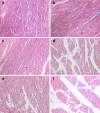The role of heat shock proteins in inflammatory injury induced by cold stress in chicken hearts
- PMID: 23636703
- PMCID: PMC3789878
- DOI: 10.1007/s12192-013-0429-8
The role of heat shock proteins in inflammatory injury induced by cold stress in chicken hearts
Abstract
The aim of this study was to investigate the effects of cold stress on the expression levels of heat shock proteins (Hsps90, 70, 60, 40, and 27) and inflammatory factors (iNOS, COX-2, NF-κB, TNF-α, and PTGEs) and oxidative indexes in hearts of chickens. Two hundred forty 15-day-old male chickens were randomly divided into 12 groups and kept at the temperature of 12 ± 1 °C for acute and chronic cold stress. There were one control group and five treatment groups for acute cold stress, three control groups, and three treatment groups for chronic cold stress. After cold stress, malondialdehyde level increased in chicken heart; the activity of superoxide dismutase and glutathione peroxidase in the heart first increased and then decreased. The inflammatory factors mRNA levels were increased in cold stress groups relative to control groups. The histopathological analysis showed that heart tissues were seriously injured in the cold stress group. Additionally, the mRNA levels of Hsps (70, 60, 40, and 27) increased significantly (P < 0.05) in the cold stress groups relative to the corresponding control group. Meanwhile, the mRNA level and protein expression of Hsp90 decreased significantly (P < 0.05) in the stress group, and showed a gradually decreasing tendency. These results suggested that the levels of inflammatory factors and Hsps expression levels in heart tissues can be influenced by cold stress. Hsps commonly played an important role in the protection of the heart after cold stress.
Figures






Similar articles
-
The role of heat shock protein 70 in oxidant stress and inflammatory injury in quail spleen induced by cold stress.Environ Sci Pollut Res Int. 2018 Jul;25(21):21011-21023. doi: 10.1007/s11356-018-2142-8. Epub 2018 May 15. Environ Sci Pollut Res Int. 2018. PMID: 29766433
-
The Antagonistic Effect of Selenium on Lead-Induced Inflammatory Factors and Heat Shock Proteins mRNA Expression in Chicken Livers.Biol Trace Elem Res. 2016 Jun;171(2):437-444. doi: 10.1007/s12011-015-0532-z. Epub 2015 Oct 15. Biol Trace Elem Res. 2016. PMID: 26470710
-
Cold stress induces antioxidants and Hsps in chicken immune organs.Cell Stress Chaperones. 2014 Sep;19(5):635-48. doi: 10.1007/s12192-013-0489-9. Epub 2014 Jan 4. Cell Stress Chaperones. 2014. PMID: 24390730 Free PMC article.
-
Heat shock proteins took part in oxidative stress-mediated inflammatory injury via NF-κB pathway in excess manganese-treated chicken livers.Ecotoxicol Environ Saf. 2021 Dec 15;226:112833. doi: 10.1016/j.ecoenv.2021.112833. Epub 2021 Sep 29. Ecotoxicol Environ Saf. 2021. PMID: 34600291
-
Astilbin Attenuates Cadmium-Induced Adipose Tissue Damage by Inhibiting NF-κB Pathways and Regulating the Expression of HSPs in Chicken.Biol Trace Elem Res. 2023 May;201(5):2512-2523. doi: 10.1007/s12011-022-03327-y. Epub 2022 Jun 18. Biol Trace Elem Res. 2023. PMID: 35717552
Cited by
-
Proteomic Responses Under Cold Stress Reveal Unique Cold Tolerance Mechanisms in the Pacific White Shrimp (Litopenaeus vannamei).Front Physiol. 2018 Nov 13;9:1399. doi: 10.3389/fphys.2018.01399. eCollection 2018. Front Physiol. 2018. PMID: 30483139 Free PMC article.
-
Chronic Mild Cold Conditioning Modulates the Expression of Hypothalamic Neuropeptide and Intermediary Metabolic-Related Genes and Improves Growth Performances in Young Chicks.PLoS One. 2015 Nov 16;10(11):e0142319. doi: 10.1371/journal.pone.0142319. eCollection 2015. PLoS One. 2015. PMID: 26569484 Free PMC article.
-
Response of turkey muscle satellite cells to thermal challenge. I. transcriptome effects in proliferating cells.BMC Genomics. 2017 May 6;18(1):352. doi: 10.1186/s12864-017-3740-4. BMC Genomics. 2017. PMID: 28477619 Free PMC article.
-
Immunomodulatory effects of phytogenics in chickens and pigs - A review.Asian-Australas J Anim Sci. 2018 May;31(5):617-627. doi: 10.5713/ajas.17.0657. Epub 2017 Dec 19. Asian-Australas J Anim Sci. 2018. PMID: 29268586 Free PMC article.
-
Oxidant and enzymatic antioxidant status (gene expression and activity) in the brain of chickens with cold-induced pulmonary hypertension.Int J Biometeorol. 2015 Nov;59(11):1615-21. doi: 10.1007/s00484-015-0968-z. Epub 2015 May 5. Int J Biometeorol. 2015. PMID: 25939899
References
-
- Anastasiya VP, Valeria VM, Ivan SC, Natalia AC, Dmitrii IL, Nikolai BG (2005) Effects of small heat shock proteins on the thermal denaturation and aggregation of F-actin. Bioche Biophy Res Commu 4:1548–1553 - PubMed
Publication types
MeSH terms
Substances
LinkOut - more resources
Full Text Sources
Other Literature Sources
Molecular Biology Databases
Research Materials

